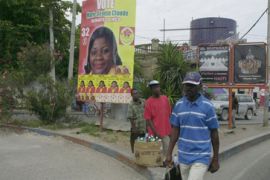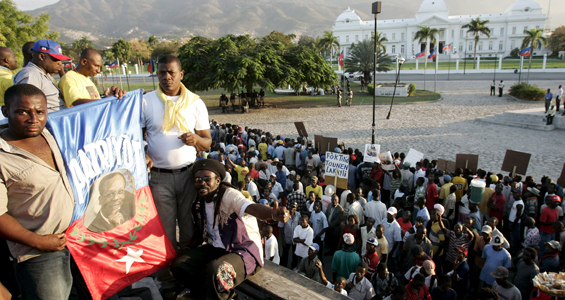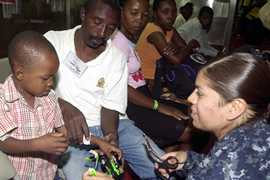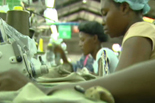Haitians vote in tense elections
Low voter turnout marks electons to senate after deposed leader’s party is disqualified.

 |
| Lavalas, headed by Aristide, has been disqualified by Haiti’s electoral council [EPA] |
Haitians have voted for a new senate, but the electoral exercise was mired in controversy after the disqualification of Fanmi Lavalas, the political party widely backed by the country’s poor.
Lavalas is the party of Jean Bertrand Aristide, the country’s former president who fled into exile after he was ousted in a coup, allegedly sponsored by the US in 2004.
It boasts thousands of followers in Cite Soleil and in all poor areas of Haiti.
Back in February, Haiti’s Provisional Electoral Council (PEC) announced that it would not recognise Lavalas candidates in the upcoming elections because their papers did not have Aristide’s signature, and that they would not accept a faxed copy.
Although Aristide was removed in 2004 and now lives in exile in Pretoria, South Africa, some Haitians have called for his return.
Popular support
“There won’t be justice in Haiti until Aristide comes back,” Junior Alexandre, a resident of Cite Soleil, told Al Jazeera.
| IN VIDEO | ||
|
| ||
| Haiti’s poorest sceptical of aid assurances | ||
More Videos… |
“This election is a lie because they have removed the strongest party.”
Vanele Louis Paul, a member of Fanmi Lavalas, told Al Jazeera: “The only way Lavalas got power is through voting and now they want to exclude us.
“We competed in an election and won. We are fighting to get into this election so we can defend our rights.”
United Nations officials had urged the PEC to include all parties.
José Miguel Insulza, the secretary general of the Organisation of American States, said: “I cannot help but express my concern about the possibility that an important group of Haitian citizens might feel that they are not being represented in this process.”
Security fears
Haiti’s security has been slowly improving since UN peacekeepers intervened in 2004, but UN patrols were intensified ahead of the elections in areas considered “red zones” – areas such as Cite Soleil.
The US and UN said that democratic elections were a sign of progress in Haiti, even if that democracy appears to only be guaranteed by the foreign troops on the streets.
Many people have told Al Jazeera that they do not care much about the elections.
A recent study by the Florida-based Haiti Priorities Project, an advocacy organisation, said there was widespread apprehension and disaffection among Haitians in the run-up to the elections.
Only five per cent of potential voters nationwide said they were ready to go to the polls. Many were more concerned by their dire economic situation.
“I don’t know anything about the elections,” Ofitat Sousise, who sells clay cookies to make a living, told Al Jazeera.
“I don’t want to know. Nobody ever does anything for us so I just know about clay.”
Although security has improved, people continue to suffer in the most impoverished country in the Americas.
Aid reliance
Foreign aid accounts for 60 per cent of the government’s budget in a nation where 80 per cent of the population lives on less than $2 a day.
 |
| Haitians have been relying on foreign aid as the country grapples with abject poverty [AFP] |
But as the global financial crisis deepens, UN officials in New York City and Port-au-Prince, the capital, are struggling to win donor aid.
Rene Preval, Haiti’s president, has said his government is trying to become more independent but it remains to be seen how this will be achieved.
“This percentage [of aid in the government budget] must be gradually decreased as Haiti becomes more able to supplement its own income,” Preval said.
“We must also encourage private investment.”
Preval was elected in 2006 with the backing of Haiti’s impoverished majority, who hoped for a return to normality and an end to the post-coup repression that left thousands of people dead.
